英语16种时态+10种被动时态
- 格式:docx
- 大小:16.04 KB
- 文档页数:1
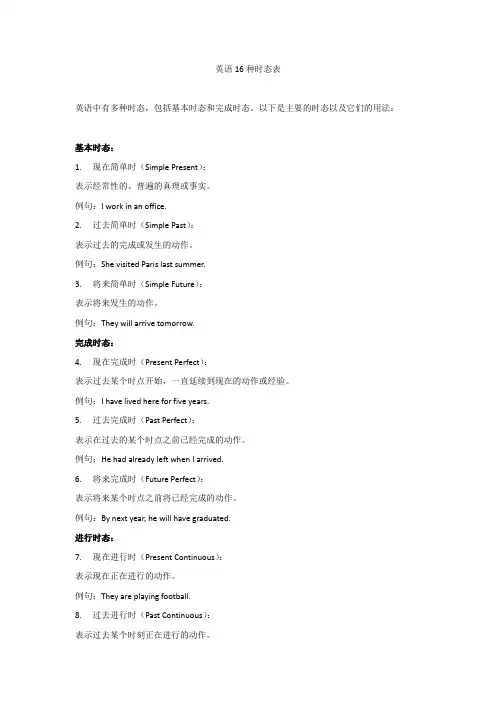
英语16种时态表英语中有多种时态,包括基本时态和完成时态。
以下是主要的时态以及它们的用法:基本时态:1.现在简单时(Simple Present):表示经常性的、普遍的真理或事实。
例句:I work in an office.2.过去简单时(Simple Past):表示过去的完成或发生的动作。
例句:She visited Paris last summer.3.将来简单时(Simple Future):表示将来发生的动作。
例句:They will arrive tomorrow.完成时态:4.现在完成时(Present Perfect):表示过去某个时点开始,一直延续到现在的动作或经验。
例句:I have lived here for five years.5.过去完成时(Past Perfect):表示在过去的某个时点之前已经完成的动作。
例句:He had already left when I arrived.6.将来完成时(Future Perfect):表示将来某个时点之前将已经完成的动作。
例句:By next year, he will have graduated.进行时态:7.现在进行时(Present Continuous):表示现在正在进行的动作。
例句:They are playing football.8.过去进行时(Past Continuous):表示过去某个时刻正在进行的动作。
例句:I was reading a book when the phone rang.9.将来进行时(Future Continuous):表示将来某个时刻正在进行的动作。
例句:This time tomorrow, we will be traveling.完成进行时态:10.现在完成进行时(Present Perfect Continuous):表示从过去某时点开始一直持续到现在的动作。
例句:I have been working on this project for two hours.11.过去完成进行时(Past Perfect Continuous):表示在过去某时点之前一直持续到过去的动作。
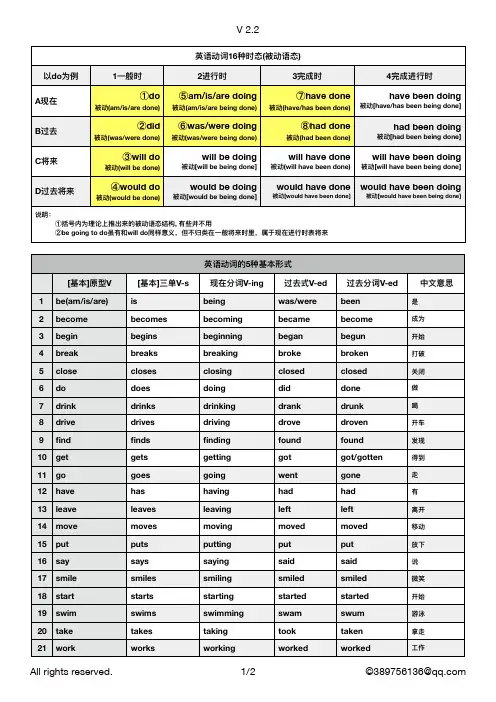
英语动词16种时态(被动语态)以do为例例1⼀一般时2进⾏行行时3完成时4完成进⾏行行时A现在①do被动(am/is/are done)⑤am/is/are doing被动(am/is/are being done)⑦have done被动(have/has been done)have been doing被动[have/has been being done]B过去②did被动(was/were done)⑥was/were doing被动(was/were being done)⑧had done被动(had been done)had been doing被动[had been being done]C将来③will do被动(will be done)will be doing被动[will be being done]will have done被动(will have been done)will have been doing被动[will have been being done]D过去将来④would do被动(would be done)would be doing被动[would be being done]would have done被动[would have been done]would have been doing被动[would have been being done]说明:①括号内为理理论上推出来的被动语态结构, 有些并不不⽤用②be going to do虽有和will do同样意义,但不不归类在⼀一般将来时⾥里里,属于现在进⾏行行时表将来英语动词的5种基本形式[基本]原型V[基本]三单V-s现在分词V-ing过去式V-ed过去分词V-ed中⽂文意思1be(am/is/are)is being was/were been是2become becomes becoming became become成为3begin begins beginning began begun开始4break breaks breaking broke broken打破5close closes closing closed closed关闭6do does doing did done做7drink drinks drinking drank drunk喝喝8drive drives driving drove droven开⻋车9findfindsfinding found found发现10get gets getting got got/gotten得到11go goes going went gone⾛走12have has having had had有13leave leaves leaving left left离开14move moves moving moved moved移动15put puts putting put put放下16say says saying said said说17smile smiles smiling smiled smiled微笑18start starts starting started started开始19swim swims swimming swam swum游泳20take takes taking took taken拿⾛走21work works working worked worked⼯工作英语16种动词时态例例句句(以do为例例)A1(⼀一般)现在present simple①I do my homework everyday.②China is a big country.A2现在进⾏行行present continuous①I am doing my homework now.②She is drinking water now.A3现在完成present perfect①I have done my homework. (I’m done with it. Now I can go out.)②I have waited for you for 2 hours. (Now you are here. Let’s go)A4现在完成进⾏行行present perfect continuous①I have been doing my homework for a long time.(I’m not donewith it. I have to keep doing it for another 2 two hours.)②I have been waiting for you for 2 hours. (You’re still on your way. Ihave to keep waiting for another 2 hours.)B1(⼀一般)过去past simple①I did my homework yesterday.②Japan invaded China in World War II.B2过去进⾏行行past continuous①I was doing my homework this time yesterday.B3过去完成past perfect①I told my mum that I had done my homework. (Then I went outfor a walk with my friend.)B4过去完成进⾏行行past perfect continuous①By the time my mum arrived home, I had been doing myhomework for 2 hours. ( But I wasn’t done. I had to keep doing itfor one more hour.)C1(⼀一般)将来future simple①I will do my homework tomorrow. (I don’t want to do it now.)C2将来进⾏行行future continuous①I will be doing my homework this time tomorrow. (Don’t call meout.)②I will be sleeping at 6:00 am tomorrow, so don’t call me. (I don’twant to be disturbed.)C3将来完成future perfect①I will have done my homework at 3:00 pm. (According to my plan,I can finish it at 3:00 pm this afternoon. So we can go to the parkand relax.)C4将来完成进⾏行行future perfect continuous①I will have been doing my homework for 2 hours by 3:00 pm. (AndI have to spend 1 more hour to finish it. I’ll finish it at 4:00 pm.D1(⼀一般)过去将来future simple in the past①I said I would do my homework after the class. (I promised myteacher)D2过去将来进⾏行行future continuous in the past①I said I would be doing my homework at 10:00 pm. (By that time,I would be doing my homework.)D3过去将来完成future perfect in the past①I promised I would have done my homework before going to bed.(My homework would be done before I went to bed.)D4过去将来完成进⾏行行future perfectcontinuous in the past①I said I would have been doing my homework for 2 hours by10:00 pm.。
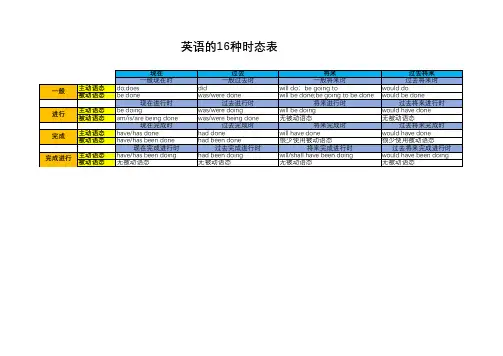
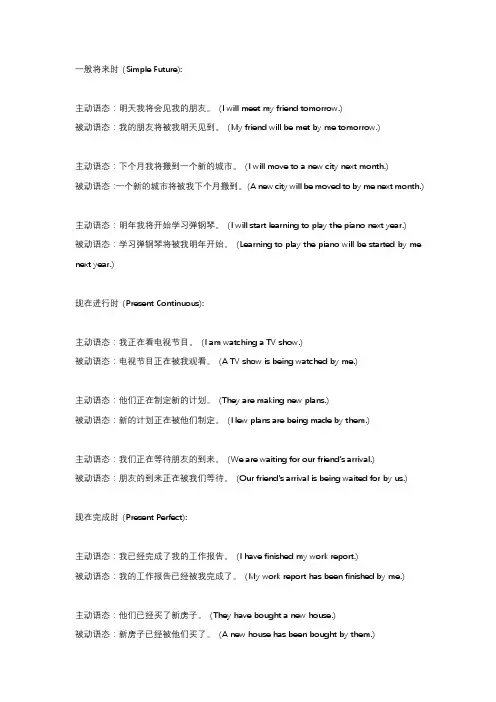
一般将来时(Simple Future):主动语态:明天我将会见我的朋友。
(I will meet my friend tomorrow.)被动语态:我的朋友将被我明天见到。
(My friend will be met by me tomorrow.)主动语态:下个月我将搬到一个新的城市。
(I will move to a new city next month.)被动语态:一个新的城市将被我下个月搬到。
(A new city will be moved to by me next month.)主动语态:明年我将开始学习弹钢琴。
(I will start learning to play the piano next year.)被动语态:学习弹钢琴将被我明年开始。
(Learning to play the piano will be started by me next year.)现在进行时(Present Continuous):主动语态:我正在看电视节目。
(I am watching a TV show.)被动语态:电视节目正在被我观看。
(A TV show is being watched by me.)主动语态:他们正在制定新的计划。
(They are making new plans.)被动语态:新的计划正在被他们制定。
(New plans are being made by them.)主动语态:我们正在等待朋友的到来。
(We are waiting for our friend's arrival.)被动语态:朋友的到来正在被我们等待。
(Our friend's arrival is being waited for by us.)现在完成时(Present Perfect):主动语态:我已经完成了我的工作报告。
(I have finished my work report.)被动语态:我的工作报告已经被我完成了。

被动语态的时态和语态变化被动语态是英语语法中的一种重要句式,它用于描述动作的承受者而不是执行者。
本文将探讨被动语态在时态和语态上的变化。
1. 时态变化被动语态的时态变化与主动语态的时态变化基本一致,只是动词的形式需要调整。
下面是一些常见时态的被动语态形式:- 现在时态:am/is/are + 过去分词- 过去时态:was/were + 过去分词- 现在完成时态:have/has + been + 过去分词- 过去完成时态:had + been + 过去分词- 将来时态:will + be + 过去分词- 过去将来时态:would + be + 过去分词例如:- Active: They clean the house every day.Passive: The house is cleaned every day.- Active: She will write the report.Passive: The report will be written by her.需要注意的是,一些特殊的时态如现在进行时、过去进行时、现在完成进行时等不常用于被动语态。
2. 语态变化被动语态的语态变化主要体现在动词形式的变化上。
被动语态强调了动作的承受者,而无需说明动作的执行者。
下面是句子中动词形式的变化规则:- 动词的时态变化如上所述。
- 不及物动词:在被动语态中需要加上适当的助动词(通常是be动词),并将其后的不及物动词转换为过去分词形式。
- 及物动词:在被动语态中需要加上适当的助动词(通常是be 动词),并将其后的宾语转换为主语,同时将主语转换为介词by 短语的宾语。
例如:- Active: He eats an apple.Passive: An apple is eaten by him.- Active: They built a house.Passive: A house was built by them.被动语态可以帮助我们准确描述动作的承受者,使句子更加灵活多样。
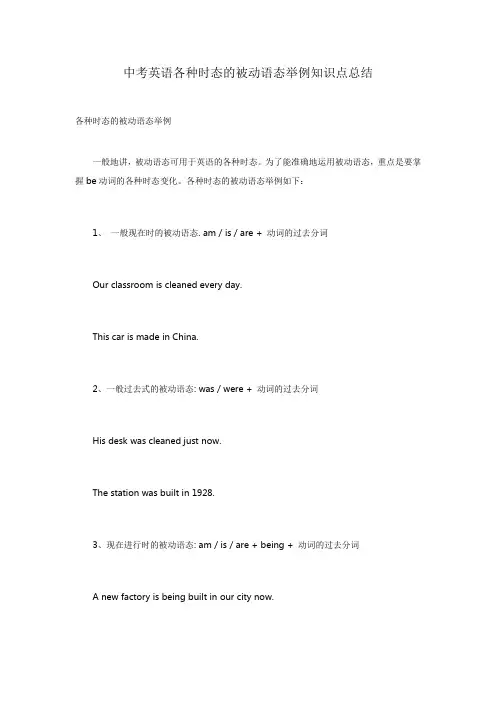
中考英语各种时态的被动语态举例知识点总结各种时态的被动语态举例一般地讲,被动语态可用于英语的各种时态。
为了能准确地运用被动语态,重点是要掌握be动词的各种时态变化。
各种时态的被动语态举例如下:1、一般现在时的被动语态. am / is / are + 动词的过去分词Our classroom is cleaned every day.This car is made in China.2、一般过去式的被动语态: was / were + 动词的过去分词His desk was cleaned just now.The station was built in 1928.3、现在进行时的被动语态: am / is / are + being + 动词的过去分词A new factory is being built in our city now.Some trees are being cut down in the park.4、过去进行时的被动语态: was / were + being + 动词的过去分词A new factory was being built in our city at that time.Some babies were being looked after by Miss Chen last year.5、一般将来时的被动语态:(A) will / shall + be + 动词的过去分词(B) am / is / are + going to be +动词的过去分词.Some new factories will be built in our city this year.Your watch is going to be mended in an hour.6、过去将来时的被动语态: (1).would / should + be + 动词的过去分词(2).was / were +going to be + 动词的过去分词.She said that some new factories would be built soon in our city.He thought that your watch was going to be mended after an hour.7、现在完成时的被动语态:have / has + been + 动词的过去分词Some new factories have been built in the city since last year.Your watch has been mended already.8、过去完成时的被动语态:had + been + 动词的过去分词He said that some new factories had been built in the city.I didn’t know that my watch had been mended .9、含情态动词的被动式:can/may/must + be + done例如:He can not be found. / I must be paid for this.。
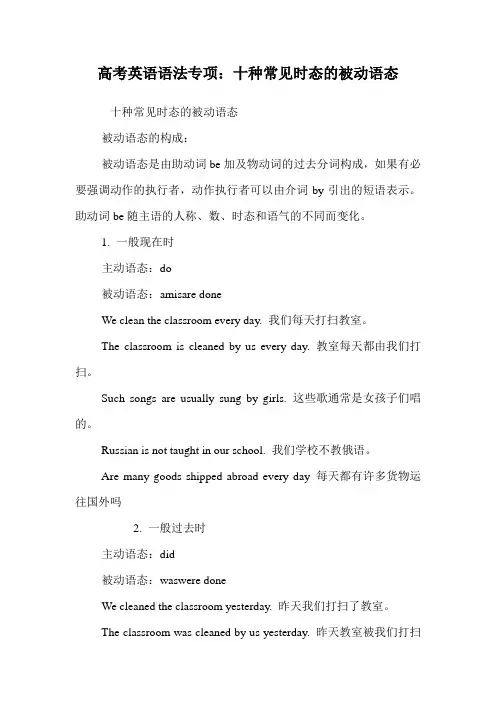
高考英语语法专项:十种常见时态的被动语态十种常见时态的被动语态被动语态的构成:被动语态是由助动词be加及物动词的过去分词构成,如果有必要强调动作的执行者,动作执行者可以由介词by引出的短语表示。
助动词be随主语的人称、数、时态和语气的不同而变化。
1. 一般现在时主动语态:do被动语态:amisare doneWe clean the classroom every day. 我们每天打扫教室。
The classroom is cleaned by us every day. 教室每天都由我们打扫。
Such songs are usually sung by girls. 这些歌通常是女孩子们唱的。
Russian is not taught in our school. 我们学校不教俄语。
Are many goods shipped abroad every day 每天都有许多货物运往国外吗2. 一般过去时主动语态:did被动语态:waswere doneWe cleaned the classroom yesterday. 昨天我们打扫了教室。
The classroom was cleaned by us yesterday. 昨天教室被我们打扫了。
The window was broken by my son. 窗子是我儿子打破的。
Were many trees planted on the hill yesterday 昨天山上种了许多树吗?How much money was stolen in all 一共被偷了多少钱?3. 一般将来时主动语态:willshall do被动语态:willshall be doneWe will clean the classroom soon. 我们很快要打扫教室。
The classroom will be cleaned soon. 教室很快要被打扫了。
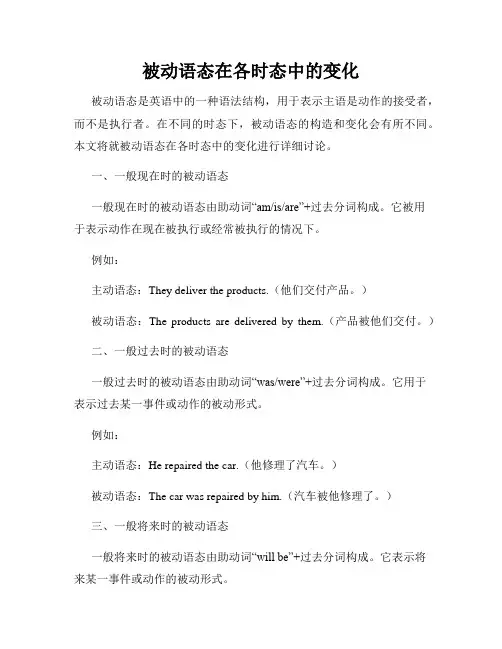
被动语态在各时态中的变化被动语态是英语中的一种语法结构,用于表示主语是动作的接受者,而不是执行者。
在不同的时态下,被动语态的构造和变化会有所不同。
本文将就被动语态在各时态中的变化进行详细讨论。
一、一般现在时的被动语态一般现在时的被动语态由助动词“am/is/are”+过去分词构成。
它被用于表示动作在现在被执行或经常被执行的情况下。
例如:主动语态:They deliver the products.(他们交付产品。
)被动语态:The products are delivered by them.(产品被他们交付。
)二、一般过去时的被动语态一般过去时的被动语态由助动词“was/were”+过去分词构成。
它用于表示过去某一事件或动作的被动形式。
例如:主动语态:He repaired the car.(他修理了汽车。
)被动语态:The car was repaired by him.(汽车被他修理了。
)三、一般将来时的被动语态一般将来时的被动语态由助动词“will be”+过去分词构成。
它表示将来某一事件或动作的被动形式。
例如:主动语态:They will complete the project.(他们将完成这个项目。
)被动语态:The project will be completed by them.(这个项目将被他们完成。
)四、现在进行时的被动语态现在进行时的被动语态由助动词“am/is/are”+being+过去分词构成。
它表示现在某一事件或动作正在被执行。
例如:主动语态:She is writing the report.(她正在写报告。
)被动语态:The report is being written by her.(报告正在被她写。
)五、过去进行时的被动语态过去进行时的被动语态由助动词“was/were”+being+过去分词构成。
它表示过去某一事件或动作正在被执行。
例如:主动语态:They were building the house.(他们在建房子。
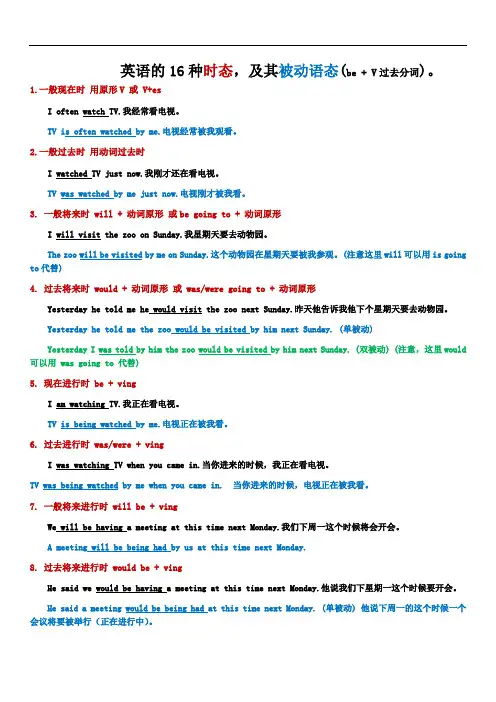
英语的16种时态,及其被动语态(be + V过去分词)。
1.一般现在时用原形V 或 V+esI often watch TV.我经常看电视。
TV is often watched by me.电视经常被我观看。
2.一般过去时用动词过去时I watched TV just now.我刚才还在看电视。
TV was watched by me just now.电视刚才被我看。
3. 一般将来时 will + 动词原形或be going to + 动词原形I will visit the zoo on Sunday.我星期天要去动物园。
The zoo will be visited by me on Sunday.这个动物园在星期天要被我参观。
(注意这里will可以用is going to代替)4. 过去将来时 would + 动词原形或 was/were going to + 动词原形Yesterday he told me he would visit the zoo next Sunday.昨天他告诉我他下个星期天要去动物园。
Yesterday he told me the zoo would be visited by him next Sunday. (单被动)Yesterday I was told by him the zoo would be visited by him next Sunday. (双被动) (注意,这里would 可以用 was going to 代替)5. 现在进行时 be + vingI am watching TV.我正在看电视。
TV is being watched by me.电视正在被我看。
6. 过去进行时 was/were + vingI was watching TV when you came in.当你进来的时候,我正在看电视。
TV was being watched by me when you came in. 当你进来的时候,电视正在被我看。
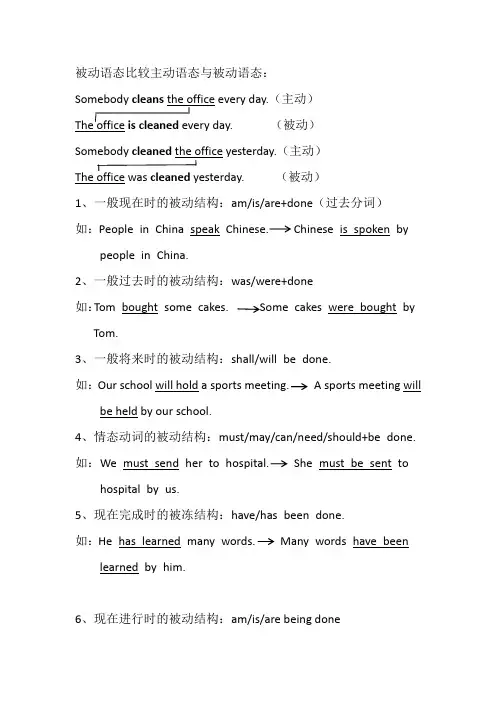
被动语态比较主动语态与被动语态:(主动)The office (被动)(主动)The office was (被动)1、一般现在时的被动结构:am/is/are+done(过去分词)如:People in China speak Chinese. Chinese is spoken by people in China.2、一般过去时的被动结构:was/were+done如:Tom bought some cakes. Some cakes were bought by Tom.3、一般将来时的被动结构:shall/will be done.如:Our school will hold a sports meeting. A sports meeting will be held by our school.4、情态动词的被动结构:must/may/can/need/should+be done.如:We must send her to hospital. She must be sent to hospital by us.5、现在完成时的被冻结构:have/has been done.如:He has learned many words. Many words have been learned by him.6、现在进行时的被动结构:am/is/are being done如:the office is being cleaned at the moment.比较主动语态与被动语态(主动)The door is being painted7、感官动词没有被动,总是用于一般现在时或一般过去时基本时态1、一般现在时:用来表示一般性的事实或有时或往往发生的事情主语+动词标志词:always/never/often/sometimes/usually 等频度副词如:I like big cities. I don't like big cities.The shop open at 9 o'clock and close at 5.30.Sue always arrives at work early.I usually go to work by car but sometimes I walk.2、现在进行时am/is/are+doing如:Tom is having a shower at the moment.You can turn off the television.I'm not watching it.这些动词不用于现在进行时:Like/love/want/know/understand/remember/depend/prefer/ hate/need/mean/believe/forget如:I'm tired.I want to go home.(而非I'm wanting)‘Do you know that girl?’‘Yes,but I don't remember her name.’3、一般过去时:主语+动词过去时如:I/we/you/they/he/she/it+watchedThey watched television yesterday evening.①否定式:可用did/didn't+动词原形如:We went to the cinema but we didn't enjoy the film.②疑问句:did+主语+动词原形如:What did your sister phone you?Where did your parents go for their holiday?4、过去进行时was/were+doing如:What were you doing at 11:30 yesterday? Were you working?In 1985 we were living in Canada.5、现在完成时:have/has+done①表示过去发生的而现在有结果的动作如:I've lost my passport. (我现在找不到我的护照)We've bought a new car.(我们现在有了一辆新车)标志词:just/already/yetWe've already met.②谈论从过去到现在的一段时间如一个人的一生时,用现在完成时(have been/have had/have played)如:Have you ever been to Japan?(从过去到现在)‘Have you been to France?’(一生中)‘No,I haven't.’现在完成进行时+ ever (疑问句中)与never比较:‘Has Ann ever been to Australia?’‘Yes,once.’(once表示“一次”) My mother has never travelled bu air.(从来没有)④gone与been比较:Bill has gone to Spain.(他现在在西班牙)Bill has been to Spain.(他去了西班牙但是现在回来了,即曾经去过/到过)6、过去完成时:had+done表示发生的时间是“过去的过去”,侧重事情的结果如:When I woke up,it had already stopped raining.I had finished reading the novel by nine o'clock last night.。
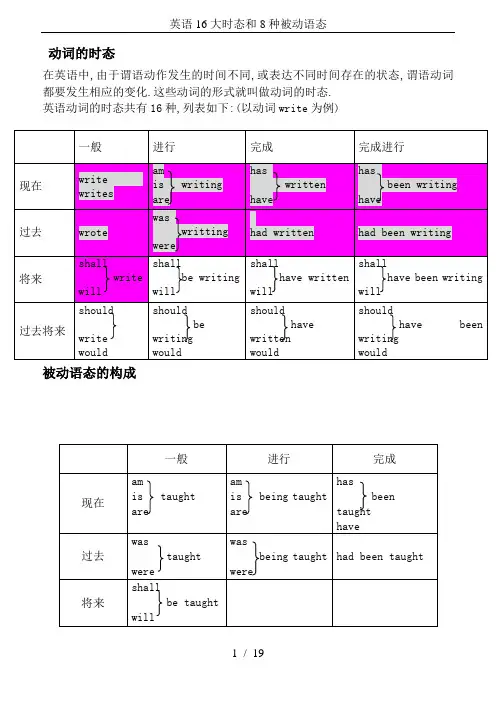
动词的时态在英语中,由于谓语动作发生的时间不同,或表达不同时间存在的状态,谓语动词都要发生相应的变化.这些动词的形式就叫做动词的时态.英语动词的时态共有16种,列表如下:(以动词write 为例)被动语态的构成一般 进行 完成 完成进行 现在 write writes am is writing arehas writtenhave has been writing have 过去wrote waswrittingwere had written had been writing 将来 shall write will shall be writing will shall have written will shall have been writingwill过去将来 should write wouldshouldbewritingwould should have written would should have been writing would 一般进行 完成 现在amis taughtare am is being taught are has been taught have 过去was taught were was being taught were had been taught 将来 shall be taught will被动语态由助动词be 加过去分词构成,时态通过be 表现出来.构成被动语态的一般疑问句时,须将第一个助动词移至主语之前,构成被动语态的否定句时,助动词后须加not. 各个时态的被动形式列表如下:(以动词teach 为例)英语被动语态讲解(一)语态的基本概念和种类语态是动词的一种形式,用来表明主语与谓语动词之间的关系。
所以英语的语态是通过动词形式的变化表现出来的。
语态有两种:主动语态和被动语态。
主语是动作的发出者为主动语态;主语是动作的接受者为被动语态。
我稍微整理了一下,一共有十六种时态。
十六种时态和他们的时间状语1.一般现在时(do /does )every day, every week , always ,usually, seldom ,never .2.一般过去时(did )yesterday , last week , ago ,the other day , just now, in the past , that day , from then on (不到现在)3.一般将来时(will do )Tomorrow ,this evening , next week , soon , at once , right away, in three minutes , justa moment.4.过去将来时(would do )the next day ,after three years ,three years later ,soon ,right away . (这些时间状语用于间接引语)5.现在进行时(am /is /are doing)now , just now , at the moment ,at present , always (带有感情色彩)6 过去进行时(was /were doing )at six yesterday evening ,from 7 to 9 yesterday evening ,at that time .7 现在完成时(have /has done )since , for some years , already , just , before, recently , so far , up till now , in t he past few years , the last ten years .8 过去完成时(had done )by +过去时间, three years before , up to the end of last year9 现在完成进行时(have /has been doing )these days , all the morning , all day long ,all the year round10 过去完成进行时(had been doing )in those day , all day (这些时间状语用于间接引语)11 将来进行时(shall/will be doing )at 8 tomorrow morning , from 2 to 3 tomorrow afternoon12 过去将来进行时(should /would be doing )at 8 the next morning ,from 7 to 8 the next morning13 将来完成时(shall /will have done )by 200814 过去将来完成时(should /would have done )by +将来时间(用于虚拟语气或间接引语), by the end of the next year15 将来完成进行时(shall /will have been doing )all tomorrow morning , all next week .16 过去将来完成进行时(should /would have been doing )all the next day , all the next week几个时态的比较1.did sth./have done sth.Who has taken away my umbrella?I can’t find it anywhere.Oh, Sally took it away just now.2.did sth./ had done sth.We learned six passages last week.We had learned six passages by the end of last week.3.have been doing/have done sth.They have repaired several cars.They have been repairing cars.语态:分为主动和被动。
动词的时态在英语中,由于谓语动作发生的时间不同,或表达不同时间存在的状态,谓语动词都要发生相应的变化.这些动词的形式就叫做动词的时态.英语动词的时态共有16种,列表如下:(以动词write为例)被动语态的构成被动语态由助动词be加过去分词构成,时态通过be表现出来.构成被动语态的一般疑问句时,须将第一个助动词移至主语之前,构成被动语态的否定句时,助动词后须加not. 各个时态的被动形式列表如下:(以动词teach为例)英语被动语态讲解(一)语态的基本概念和种类(二)语态是动词的一种形式,用来表明主语与谓语动词之间的关系。
所以英语的语态是通过动词形式的变化表现出来的。
语态有两种:主动语态和被动语态。
主语是动作的发出者为主动语态;主语是动作的接受者为被动语态。
(三)如:They built the bridge.(四) The bridge was built by them.(五)(二)被动语态的构成(六)被动语态由“助动词be+及物动词的过去分词”构成。
人称、数和时态的变化是通过be的变化表现出来的。
(七)歌诀是:被动语态be字变,过去分词跟后面。
(八)情态动词的被动语态是常考的一个知识点:情态动词+be+过去分词(九)(三)被动语态的用法(十)1)不知道或没有必要说明动作的执行者是谁。
例如:(十一)Some new computers were stolen last night. 一些新电脑在昨晚被盗了。
(不知道电脑是谁偷的)(十二)This book was published in 1981. 这本书出版于1981年。
(十三)(2)强调动作的承受者,而不强调动作的执行者。
例如:(十四)the window was broken by Mike. 窗户是迈克打破的。
(十五)This book was written by him. 这本书是他写的。
(十六)Eight hours per day for sleep must be guaranteed. 每天8小时睡眠必须得到保证。